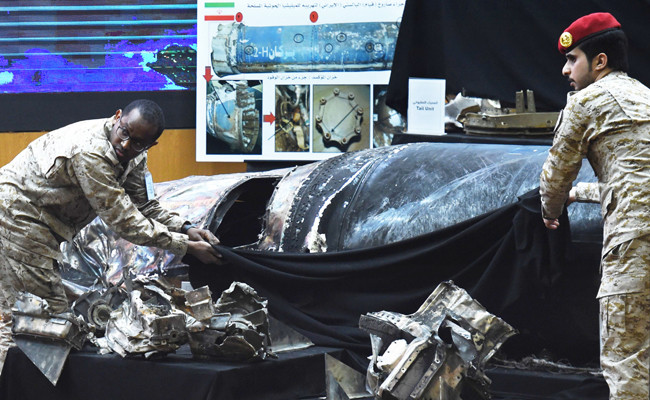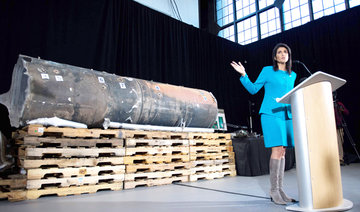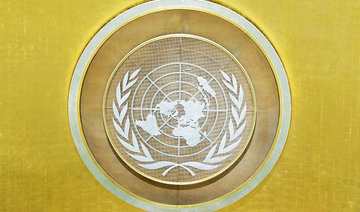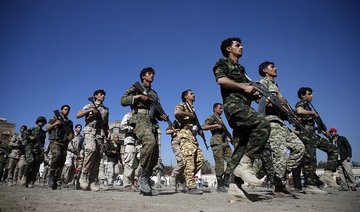RIYADH: JEDDAH: World leaders joined a chorus of anger and condemnation on Monday after Houthi militias in Yemen launched a barrage of Iranian-supplied ballistic missiles at civilian areas of four cities in Saudi Arabia.
Three of the seven rockets fired on Sunday night targeted Riyadh, two were aimed at Jazan, and the others were launched toward Khamis Mushayt and Najran. Saudi air defenses intercepted all seven. An Egyptian civilian worker was killed by falling debris, and two others were injured. The Saudi-led coalition supporting Yemen’s internationally recognized government said the attacks all targeted populated areas.
In Riyadh on Monday, the Saudi-led coalition in Yemen displayed wreckage from the missiles, which analysis indicated were supplied by Iran. The coalition “reserves the right to respond against Iran at the right time and right place,” spokesman Col. Turki Al-Maliki said.
Condemnation of the attack was led by the United Nations and the United States, followed by the Arab League, the UAE, Bahrain, Kuwait, Jordan, Pakistan, Russia, Italy, Algeria and Sudan.
UN Secretary-General Antonio Guterres “strongly condemns the launch late yesterday of a series of missiles claimed by the Houthis toward cities in Saudi Arabia, including Riyadh, as he does consistently with all attacks against civilians,” the UN said. Guterres will meet Saudi Crown Prince Mohammed bin Salman at UN headquarters in New York on Tuesday to discuss Yemen.
The US confirmed its support to Saudi Arabia in defending the Kingdom’s borders. “We continue to call on all parties, including the Houthis, to return to political negotiations and move toward ending the war in Yemen,” the State Department said.
Kuwait's Permanent Representative to the UN, Mansour Al-Otaibi, callled on the UN Security Council to intervene to stop the Houthi missile attacks on the Kingdom. He added Houthi militias undermine all opportunities for peace in Yemen and their attacks are a dangerous escalation.
The United States joined in strongly condemning the dangerous Houthi missile attacks.
"We support our Saudi partners' right to defend their borders against these threats. We continue to call on all parties, including the Houthis, to return to political negotiations and move toward ending the war in Yemen," said spokesperson for the US Department of State Heather Nauert.
Algeria also strongly condemned the attack and affirmed its solidarity and full support to King Salman, the Saudi government and its people in the face of any attempt to target its security and stability. It called for the immediate cessation of hostilities that will deepen the crisis and increase the escalating tension in the region.
Leading analyst Oubai Shahbandar told Arab News: “Officials in Tehran seem intent on escalating the Yemeni conflict into wider regional instability. That makes the prospects for a negotiated peace settlement in Yemen under UN auspices that much more difficult to attain.”
Senior analyst and columnist, Dr. Majid Rafizadeh, said: “This reveals that the Iranian regime is determined to destabilize the region and expand its influence through its proxies and by smuggling and supplying the Houthis with weapons.”
“These acts are in violation of two UN resolutions: 2216, which imposes an arms embargo on Yemen’s Houthi militia, and 2231, which bans Iran from transferring weapons and advancing its ballistic missile program in specific instances," he added.
Rafizadeh called on the UN and EU to impose targeted sanctions on Iran.
War crime
The human rights group Amnesty International said the Houthi missile attacks could be a war crime.
“Launching indiscriminate attacks is prohibited by international humanitarian law,” said Amnesty’s Samah Hadid.
“A high death toll may have been averted, possibly due to the missiles being intercepted, but that doesn’t let the Houthi armed group off the hook for this reckless and unlawful act.
“These missiles cannot be precisely targeted at such distances, so their use in this manner unlawfully endangers civilians.”
Amnesty did not say it had independently documented evidence of the attacks.
In Rome, Italy’s Minister of Foreign Affairs Angelino Alfano pledged his country’s full solidarity with Saudi Arabia, saying: “The Houthi rebels’ provocative behavior undermines security and stability in the region and contributes to the deterioration of the political and military situation in Yemen.”
Alfano added that ending the conflict in Yemen “must be the main priority” as it “is also essential for addressing the civilians’ urgent humanitarian needs.”
“Italy is ready to offer its assistance to the UN new special envoy to Yemen, Martin Griffiths, in hope that he will push forward the negotiations aimed at ending this conflict,” Alfano said.
UK to Iran: Stop arming Houthis
Britain had earlier called on Iran to “stop sending weapons” to the Houthi militias and use its influence instead to end the conflict, Asharq Al-Awsat newspaper reported on Sunday.
In a joint statement on the occasion of the three-year anniversary of the start of the Saudi-led Arab military intervention against the Houthi militias in Yemen, Britain’s Foreign Secretary Boris Johnson and International Development Secretary Penny Mordaunt said that “if Iran is sincere in its commitment to support a political solution in Yemen, it must stop sending weapons that prolong the conflict, fuel regional tensions and pose a threat to international peace and security.”
“We are wondering why Iran is spending a lot of money in a country with which it has no real historical ties or interests, rather than using its influence to end the conflict for the benefit of the Yemeni people,” the ministers said in their statement.
In September 2014, the Houthis expelled pro-government forces from Sanaa and took control of the capital and several parts of the country.
“We support the efforts of the Saudi-led coalition to restore legitimacy in Yemen, as approved by the UN Security Council,” the British ministers said in a statement.
A report by UN experts concluded that Tehran was involved in arming the Houthis.
The United Nations is making a fresh push for talks after Iran sent signals that it would be willing to help turn up the pressure on the Houthis to take part in negotiations, UN diplomats said.
New UN envoy Martin Griffiths was in the rebel-held capital Sanaa this week for talks on kick-starting the political process, following a first round of meetings in Riyadh.
About 10,000 Yemenis have been killed and 53,000 wounded since the coalition intervened in Yemen in March 2015.





























